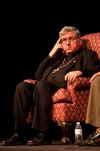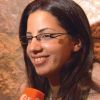Collins urges Catholics to cross Palestinian-Israeli divide
TORONTO - The complexity, heartbreak and bitter politics of the endless Palestinian-Israeli conflict are no reason for Christians to either settle for easy answers or to throw up their hands in despair. The situation calls for Christian charity and solidarity, Cardinal Thomas Collins told a packed theatre in Toronto Sept. 5.
Collins was on hand for the Toronto premiere of the Salt + Light TV documentary Across the Divide. The full-length documentary takes a close look at Bethlehem University — the only Catholic post-secondary institution in the Holy Land — and the trials of fourth-year commerce student Berlanty Azzam. Azzam was caught up in a maze of Israeli military security procedures that saw her detained and prevented from returning to Bethlehem to finish her degree.
Azzam's detention by Israeli forces while she was on her way to a job interview in Ramallah became an international incident in 2009. The case blew up while Salt + Light producer Kris Dmytrenko and a crew were on the Bethlehem University campus making a film about the Christian Brothers and their 39-year-old university just outside Jerusalem.
If the Church has to pick a side, it chooses to stand with the poor and the refugees, said Collins in a panel discussion after the screening. Collins was a participating bishop in the Synod on the Middle East in 2010.
"We have to help them," said Collins, who has spearheaded efforts by Canadian dioceses to sponsor Iraqi refugees displaced by the turmoil in their homeland. "We would prefer, of course, that they can flourish in their home."
The whole point of Bethlehem University is that it is a means for Palestinians — Chistians and Muslims — to flourish where they are, said Robert Smith, the university's vice chancellor. The university's student body is about 70 per cent Muslim and 30 per cent Christian.
"They (graduates) will be trained and professional and committed to build a nation as well as a Church," he said.
Dmytrenko, co-director of Across the Divide, warned against the temptation to name good guys and bad guys in the conflict.
"There's a lot of people suffering on both sides," he said. "It's not a case of who is suffering more."
"People think that all Muslims are terrorists trying to get rid of all Christians. That's not true," said Catholic Near East Welfare Association Canada director Carl Hetu.
As a Maronite Catholic from Lebanon, it was important to Mona Dagher to be at the documentary's premiere.
"I would hope that people will at least know what is going on there," said Dagher.
She praised the film for accurately depicting the lives of Palestinian Christians.
Ajax high school teacher Deanna Wilson said she plans to show the movie to her Grade 12 World Religions class.
"We have an obligation to open our lens to other religions and realities," she said.
She hopes particularly that her comfortable, suburban teens are moved by Azzam's struggle to get an education.
"There are a lot of details I wasn't aware of," said Danny Ferguson at the end of the evening. "It's important to understand the political environment."
"This gets the word out. This gets out the truth and the fullness of the truth," said Smith.
"Our purpose in making this documentary was not to convince. It was simply to tell a story," Salt + Light CEO Fr. Tom Rosica told the audience.
Rosica said he's received calls from committed advocates for both sides in the conflict — Palestinians, Jews and their allies — all equally unhappy with the film. But rather than buying into the rhetoric of the conflict the film strives to accurately fill in the political, economic, social and religious reality Bethlehem University struggles with daily.
I first met Berlanty Azzam just outside the Old City of Jerusalem. Pulling up in a taxi, the business administration student had arrived directly from the Gaza Strip. Our cameraman was determined to capture her exact moment of arrival.
It was the first time she had been in Jerusalem in years and, more importantly, the first time that the Israeli government permitted her to leave Gaza since she had been deported there from the West Bank one month earlier. She was now preparing to meet with her lawyers before she contested the deportation at Israel’s Supreme Court.



